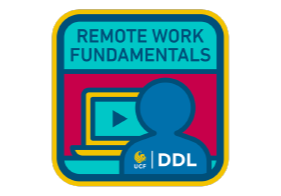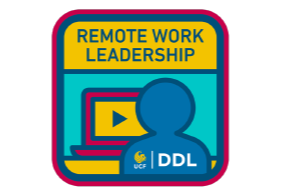Using Digital Badges to Incentivize Professional Development
Published by: WCET | 2/8/2022
Published by: WCET | 2/8/2022
We are thrilled that Anita Gabbard and Beth Nettles from the University of Central Florida, share their journey of creating a digital badge program for hybrid work. Their responsiveness to the challenge of preparing staff to successfully work in a variable environment is inspiring and insightful. Thank you Anita, Beth, and team!
~Megan Raymond, WCET
As the COVID pandemic began its third year, the Executive Team of the Division of Digital Learning (DDL) at the University of Central Florida (UCF) began looking for ways to keep their team leads engaged, motivated, and prepared to supervise their evolving work environment. Digital badges for completing professional development and training offered one solution.
The Transition from Remote to Hybrid Work
The first year of the pandemic was a crazy time involving immediate shutdowns, working remote, and a transition to prepare faculty to teach remotely. At the beginning of the second year, we could collectively slow down and assess our situation. We had questions about how to work effectively in a remote environment, and we required guidance. To find answers, we sought out podcasts, articles, and research documents to help us figure out how to navigate this new environment. While many employers had embraced remote work for years, UCF’s Division of Digital Learning (DDL) had not. We had always been a ‘be visible and available for our clients’ type of organization, and this shift was new for many of us.

During the pandemic, DDL formed a Hybrid Work Task Force as a proactive approach to the return to the campus request from the President. The recommendation was to conduct a Hybrid Work Pilot program allowing employees to work up to three days off site and two days onsite. Not unexpectedly, once underway, the hybrid work schedule generated questions about safety, supervision, accountability, and how to maintain the DDL culture.
During this transition, the responsibility for keeping their teams engaged, productive, and connected to each other became a crucial role for team leads. While they had done this in face-to-face and now virtual environments, this was the first-time team leads were supervising in a hybrid work environment. For teams to be successful, we needed to provide them with specific resources and training on the topic.
One Solution: A Remote Work Learning Badge
UCF invested in the LinkedIn Learning (LiL) platform years ago. To their credit, LiL was generating content on many of the topics we wanted our team leads to learn. And we needed a way to encourage and recognize team leads for completing the courses. Time was a scarce commodity with a lot of competing priorities.
Much has been written about the benefits of digital badges and micro-credentials in academics. Besides being able to share your accomplishments on social media, digital badges offer other benefits including skill documentation, recognition for acquiring a new skill, and motivation for continuous learning. Digital badges, however, appear to be most successful when used to recognize soft skills such as communication, decision-making, time management, leadership, and problem solving.
DDL had cultivated an interest in academic digital badges for years. In the past, badges were issued to students for completing Information Literacy modules, and the Continuing Education program issued badges for completing certification programs. Issuing digital badges to employees for professional development was a new direction. The Remote Work Leadership badge was intended to encourage supervisors to watch a series of videos on the topic of managing remote teams. The Hybrid Work Implementation team selected a series of courses from LiL from which the supervisors could choose, including the following course options:
To earn the badge, Team Leads needed to watch and successfully complete four of the eight courses.


We promoted the new program and received support from our Vice Provost. In fact, he was the first to earn the Remote Work Leadership badge, and his posting on social media generated even more interest.
We strived to make the process as simple as possible. When the team lead completed four courses, they would send an email to the admin team with their evidence attached. This was then forwarded to the manager who oversees our digital badging platform who would then issue the badge.
Another Solution: The Remote Work Foundations Badge
Right away we realized that some of the courses covered material that would be valuable for all employees, not just supervisors. So, we developed a second series, moved a couple of the courses from the Leadership list to a Foundations list, and added richer content to the supervisor’s side. We then created a new badge entitled Remote Work Foundations. Employees needed to successfully complete four of the nine selected LiL courses to receive the badge. The list of courses options include:
Lessons Learned and What Comes Next
We are just in the beginning stages of the series but have already experienced an unexpected outcome. Our Vice Provost posted his badge on LinkedIn and shared the program at the Provost Council meeting. We were approached by other departments who wanted to earn the badge. Since then, we have extended the program criteria beyond DDL and have seen success. Those who complete the courses, are posting their badges on LinkedIn, which further increased excitement for the program.
In anticipation of increased participation, we have created a process for collecting the names of badge earners in a spreadsheet for issuing badges in bulk rather than one at a time. In the future, we plan to survey the staff to determine continued interest and other badging opportunities. We are now considering several exciting options, one of which is to tier the badges, offering badges for each completed course leading up to the Leadership or Foundation badge. This would allow for a more robust and detailed explanation of skills acquired from the badges.
Manager, Division Operations, University of Central Florida
Manager, Learning Content Development, University of Central Florida